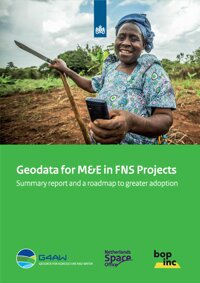Geodata for M&E in FNS Projects: Summary report and a roadmap to greater adoption
 Geodata has the potential to significantly improve how we conduct monitoring and evaluation (M&E) in development work. Using geodata and remote sensing, we can perform different aspects of M&E at a lower cost, with quicker turnaround times, and with much less burden on project participants compared to traditional methods. This approach also allows for post-project analyses to be carried out years after projects have ended, which is particularly useful for assessing changes in land use, agricultural activity, and certain environmental factors. Additionally, through proxies, geodata can help monitor changes in household wealth, dietary diversity, and food security.
Geodata has the potential to significantly improve how we conduct monitoring and evaluation (M&E) in development work. Using geodata and remote sensing, we can perform different aspects of M&E at a lower cost, with quicker turnaround times, and with much less burden on project participants compared to traditional methods. This approach also allows for post-project analyses to be carried out years after projects have ended, which is particularly useful for assessing changes in land use, agricultural activity, and certain environmental factors. Additionally, through proxies, geodata can help monitor changes in household wealth, dietary diversity, and food security.
This report explores how geodata can contribute to M&E in development work, particularly regarding the new Food and Nutrition Security (FNS) goals and indicators formulated by the Dutch Ministry of Foreign Affairs (MFA). These FNS indicators are designed to track progress towards the SDG-based Dutch policy goals for 2030 with reliable evidence. Our exploration is informed by the experiences of the Geodata for Agriculture and Water (G4AW) programme from the Netherlands Space Office (NSO). This report includes the outcomes of a workshop on this topic held in the Netherlands in 2023, organized by Bopinc on behalf of the Netherlands Space Office.